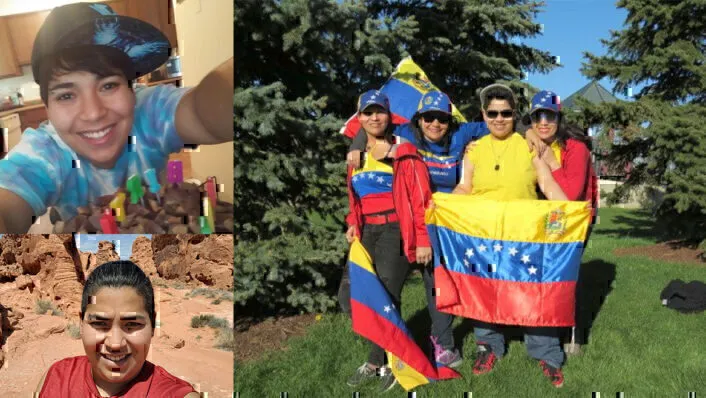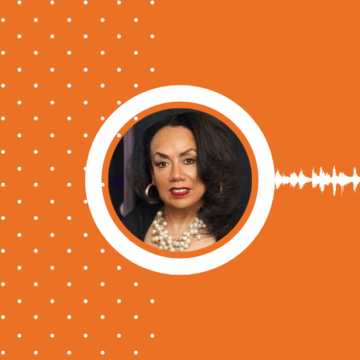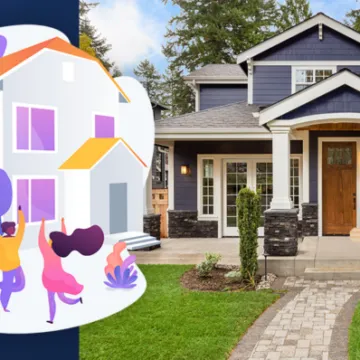National Hispanic Heritage Month honors the cultures and contributions of both Hispanic and Latino Americans as we celebrate the rich heritage rooted in all Latin American countries.
The following is a personal story from Rixy R., a GreenPath Bilingual Financial Wellness Expert who has been with GreenPath for more than 4 years.
Rixy is dedicated to helping those we serve get on the path to financial health and wellness, She shares her immigration experience as a way to connect with Hispanic clients, as well as the larger community, to enhance understanding across cultures.
Born in Maracaibo, Venezuela
I was born in Maracaibo, Venezuela and immigrated to the United States when I was 5 years old.
Back in 1995 my family was one of the few Hispanic families in the small midwestern Michigan town where we moved to, and this was one of the first challenges I faced.
I moved to the US with my two older sisters and one of my brothers-in-law was lucky to get approved for a work visa which is how we got here.
None of us spoke English when we first got here, and I am sure it was one of the most difficult decisions for my sisters to make to leave our parents and family in Venezuela.
We left everything behind because we wanted a better future and more opportunities in the states.
During that time in Venezuela the political climate was very dangerous with Chavez being in power and it was not safe to raise a family there. Since then life for people is worse than before with people not being able to eat, feel safe, and not able to take care of their family.
As a young child I was blessed that my sisters decided to bring me with them, however I also was away from my mom which was the most painful thing for me growing up.

A Story with Many Chapters
One of my biggest reasons for sharing my story is that I believe sometimes people that do not know much about immigration or perhaps they may think that it is a simple process.
It’s not easy to share but, I was an undocumented immigrant for all of my childhood.
The word “illegal” is very strong to be placed towards a human, but that is what I felt for so many years. I wish I would have realized sooner that immigration was a process and viewed myself as undocumented versus illegal.
I remember during kindergarten halfway through the year, I was sent back to Venezuela.
First grade I did complete in Venezuela and then second grade I did half of the year here. During that time I was only able to stay in the state for 6 months. If my family decided to keep me here longer, I would become undocumented.
This was something that my family could not hide from me because I asked many questions.
As I got older my status became scarier because I would hear things about people getting deported. I was terrified, living here in the states was all I knew.
I also worked very hard in high school to be sure I could get scholarships and set myself up for success.
I found out that without having my residency and legal status I was not going to be able to go to college. I was devastated because my whole life that is all I wanted to do get a degree and improve my future.
However, I was not going to be allowed to go to school because of my immigration status.
We were lucky that our attorney found a way and my sister was finally able to adopt me.
When I was 17, I finally became a legal resident. I cannot even begin to explain how many sleepless nights we all had, and I know that there are so many Hispanic families still facing this issue today.
A Rich Heritage
If you all get the chance I would suggest you try one of our main foods which is called an Arepa. It is a flat round corncake that you stuff with anything you want, similar to a sandwich.
Another traditional food is Hallacas that are usually only served during the holidays. They are similar to a tamale with different toppings inside and covered with a plantain leaf.
One of the most traditional Venezuelan foods is called Pabellon. This dish is served with white rice, black beans, shredded beef, plantains and some areas eggs too. Another holiday tradition that I have learned other countries do this too, is where for new years we put 12 grapes in the champagne glass and when the new year gets here at midnight we all drink the champagne and eat the grapes. Each grape represents a different wish and this is something that I still do with my wife and friends now.
Usually Venezuela is known for its oil, Miss Universe, and the highest waterfall is there within our borders – the beautiful Angel Falls.
Our native music is Gaitas (bagpipes) which are most popular during the holidays. We love to dance and have fun!
I have not been back there yet but with information from websites, and memories about Venezuela my family has told me, there are many natural beauty destinations. There are beautiful national parks and various natural landscapes to see and enjoy.
Growing up I did not have much family here but I am very grateful that now many of my cousins, aunts and most importantly my mom has move to Michigan.
Family Traditions
Venezuelans like many Hispanic families, value family as most important and making decisions as a collective family is crucial.
I am very proud to be a Venezuelan and although I was raised in the states, my family made sure to teach me some traditions.
In our family, it was a rule to always speak Spanish in the home, and I am so grateful because now I am able to speak, write and read in Spanish.
Proud To Be Venezuelan-American
Today, I am proud to be a Venezuelan-American and beyond proud to now be a United States Citizen as of February of 2022.
I am also proud to work at GreenPath where I can help both Spanish and English speaking clients towards reaching financial freedom!
GreenPath gave me the opportunity to share my story. I hope others will read this and understand the complex situation of immigration and how it can impact Hispanic families like mine.









